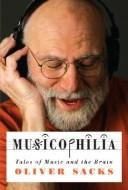
Musicophilia
Tales of Music and the Brain
کتاب های مرتبط
- اطلاعات
- نقد و بررسی
- دیدگاه کاربران
نقد و بررسی

October 15, 2007
Neurologist and professor Sacks, best known for his books Awakenings and The Man Who Mistook His Wife for a Hat, dedicates his latest effort to the relationship between music and unusual brain disorders. Embracing the notion that neurology is an inherently British phenomenon, foreign to the New World, Sacks's book is read by impeccably polished actor Prebble (PW's 2006 Narrator of the Year). As befitting so urbane and smooth a reader, Prebble sounds as if his shirt had just been starched and his lab coat carefully pressed before beginning. With nary a word out of place, Prebble steps onto the stage, playing the good Dr. Sacks for this one-time-only performance. Simultaneous release with the Knopf hardcover (Reviews, Aug. 27).

August 27, 2007
Sacks is an unparalleled chronicler of modern medicine, and fans of his work will find much to enjoy when he turns his prodigious talent for observation to music and its relationship to the brain. The subtitle aptly frames the book as a series of medical case studies—some in-depth, some abruptly short. The tales themselves range from the relatively mundane (a song that gets stuck on a continuing loop in one's mind) through the uncommon (Tourette's or Parkinson's patients whose symptoms are calmed by particular kinds of music) to the outright startling (a man struck by lightning subsequently developed a newfound passion and talent for the concert piano). In this latest collection, Sacks introduces new and fascinating characters, while also touching on the role of music in some of his classic cases (the man who mistook his wife for a hat makes a brief appearance). Though at times the narrative meanders, drawing connections through juxtaposition while leaving broader theories to be inferred by the reader, the result is greater than the sum of its parts. This book leaves one a little more attuned to the remarkable complexity of human beings, and a bit more conscious of the role of music in our lives.

September 15, 2007
Neurologist Sacks ("The Man Who Mistook His Wife for a Hat") plays pianoe.g., Chopin mazurkasand has treated musicians with brain and peripheral nerve problems. As always, he writes impeccably here but takes on such unusual, highly technical problems of music and medicinee.g., musical hallucinations, cochlear amusia, Tourettes syndromethat readers who dont know a lobe from a sulcus will be challenged. Writing about himself, however, Sacks is wonderful, as in Lamentations: Music and Depression, wherein he talks about how music may lose its power to engage people who are suffering depression after loss; then, suddenly and unexpectedly, music makes contact, releases stifled grief, and restores enthusiasm for life. Better for a general audience are Daniel J. Levitins "This Is Your Brain on Music" and Anthony Storrs "Music and the Mind", both of which are highly regarded by Sacks. This book is best suited to large general collections and those focused on music and neuroscience. [See Prepub Alert, "LJ" 6/1/07.]E. James Lieberman, George Washington Univ. Sch. of Medicine, Washington, DC
Copyright 2007 Library Journal, LLC Used with permission.

September 1, 2007
Music seems to be meaningless, and our love of it inexplicable, but neurologist Sacks, one of the foremost physician-essayists of the day, charmingly argues that music is essential to being human in ways that have only begun to be understood. In many different circumstances, music may arise involuntarily within a person, as attested to by Sacks initial presentation of cases of sudden intense affinity for music and development of musical skills, of so-called brain worms or tunes that automatically repeat within the mind, and of musical seizures and hallucinations. Despite the range of individual experience of music, from amusia, or incomprehension of melody and/or rhythm and/or harmony, to absolute (perfect) pitch to synesthesia (e.g., seeing the colors of tones), it seems from the clinical literature that anyone could have a sudden loss or gain in musicality. Indeed, the seeming universality of musical mental imaging, even in the utterly deaf, has encouraged the therapeutic use of music to treat an ever-increasing number of illnesses, including the results of severe brain damage, congenital retardative conditions, and such degenerative neuropathies as parkinsonism and Alzheimers. Sacks reporting on all of this makes for quite an omnium-gatherum on the main contention that, in essence, musicality is humanity. His customary erudition and fellow-feeling ensure that, no matter how clinical the discussion becomes, it remains, like the music ofMozart, accessible and congenial.(Reprinted with permission of Booklist, copyright 2007, American Library Association.)

























دیدگاه کاربران